
Platydoras costatus, the Raphael catfish, is a species of thorny catfish native to rivers in Suriname and French Guiana. It was long confused with other species in the genus Platydoras, especially the more widespread "true" striped Raphael catfish. P. costatus grows to a length of 24 cm (9.4 in) SL, and unlike P. armatulus the light stripe along the body of P. costatus does not extend onto the head. This fish is a minor component of local fisheries and is also found in the aquarium trade.

Xylotoles costatus, the Pitt Island longhorn beetle, is a species of beetle in the family Cerambycidae. It is endemic to the Chatham Islands. Once thought to be extinct, it is now known to survive on South East Island/Rangatira; being therefore an example of a so-called "Lazarus taxon".

Lobatus is a genus of very large sea snails, marine gastropod mollusks in the family Strombidae, the true conchs.

Lobatus costatus, formerly known as Strombus costatus, or commonly known as the milk conch, is a species of large sea snail, a marine gastropod mollusk in the family Strombidae, the true conchs. They are an edible species and important food source for the inhabitants of where they are found. Conchs are most notable for their medium to large-sized ornamental shells. Milk conchs are dispersed among the tropical waters of the Atlantic Ocean, along the coasts and islands of North, Central, and South America.
Antiguraleus is a genus of sea snails, marine gastropod mollusks in the family Mangeliidae.
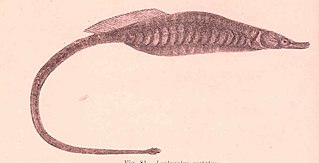
The deepbody pipefish is a species of pipefish endemic to Australia where it is only found along the southern coast. This species grows to a length of 12.9 centimetres (5.1 in) SL. This species is the only known member of the monotypic genus Kaupus which is named in honour of the ichthyologist Johann Jakob Kaup (1803-1873).
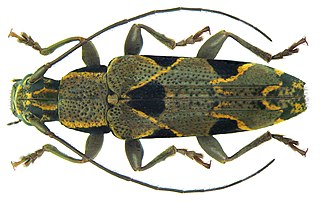
Tmesisternini is a tribe of beetles in the subfamily Lamiinae containing the following genera:
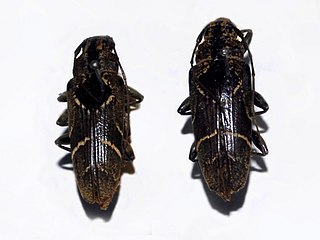
Tmesisternus is a genus of longhorn beetles belonging to the family Cerambycidae, subfamily Lamiinae.
Foliella is an extinct genus of conodonts in the family Ellisoniidae.
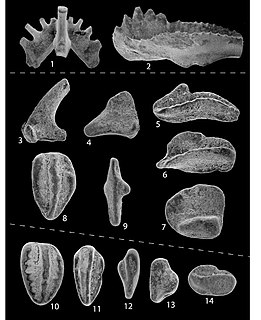
Polygnathus is an extinct genus of conodonts.
Ooperipatus is a genus of Australian velvet worms in the Peripatopsidae family.
Ooperipatus costatus is a species of velvet worm in the Peripatopsidae family. It is found in New South Wales and the Australian Capital Territory.
Tmesisternus agriloides is a species of beetle in the family Cerambycidae. It was described by Francis Polkinghorne Pascoe in 1867.

Tmesisternus distinctus is a species of beetle in the family Cerambycidae. It was described by Jean Baptiste Boisduval in 1835.
Tmesisternus dubius is a species of beetle in the family Cerambycidae. It was described by Xavier Montrouzier in 1855.
Tmesisternus jaspideus is a species of beetle in the family Cerambycidae. It was described by Jean Baptiste Boisduval in 1835.
Tmesisternus schaumii is a species of beetle in the family Cerambycidae. It was described by Francis Polkinghorne Pascoe in 1867. It is known from Moluccas, Australia, and the Solomon Islands.
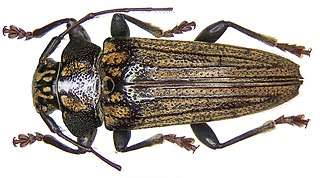
Tmesisternus venatus is a species of beetle in the family Cerambycidae. It was described by James Thomson in 1864.
Pityohyphantes costatus, the hammock spider, is a species of sheetweb spider in the family Linyphiidae. It is found in the United States.
Aspidoscelis costatus, also known commonly as the western Mexico whiptail and el huico llanero, in Spanish, is a species of lizard in the family Teiidae. The species is endemic to Mexico. There are eight recognized subspecies.








